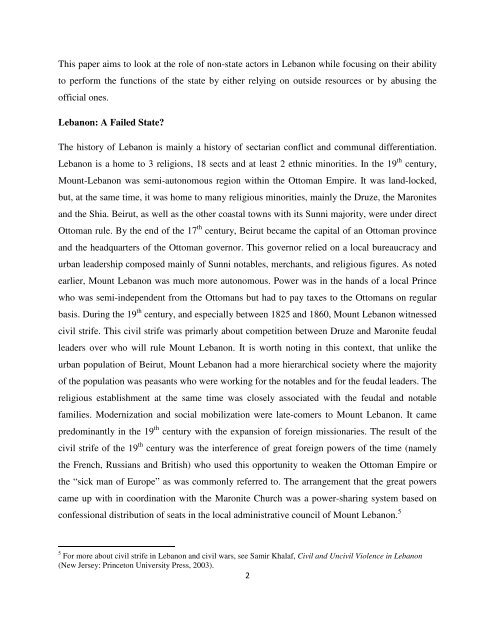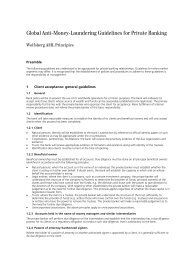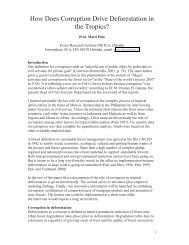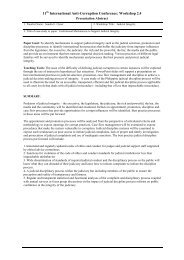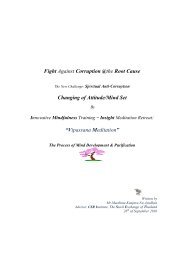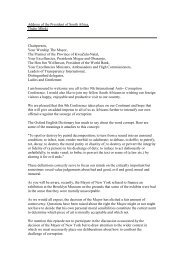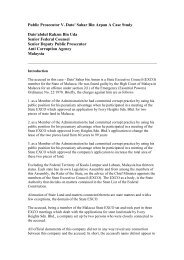The Role of Non-State Actors in Lebanon - International Anti ...
The Role of Non-State Actors in Lebanon - International Anti ...
The Role of Non-State Actors in Lebanon - International Anti ...
You also want an ePaper? Increase the reach of your titles
YUMPU automatically turns print PDFs into web optimized ePapers that Google loves.
This paper aims to look at the role <strong>of</strong> non-state actors <strong>in</strong> <strong>Lebanon</strong> while focus<strong>in</strong>g on their abilityto perform the functions <strong>of</strong> the state by either rely<strong>in</strong>g on outside resources or by abus<strong>in</strong>g the<strong>of</strong>ficial ones.<strong>Lebanon</strong>: A Failed <strong>State</strong>?<strong>The</strong> history <strong>of</strong> <strong>Lebanon</strong> is ma<strong>in</strong>ly a history <strong>of</strong> sectarian conflict and communal differentiation.<strong>Lebanon</strong> is a home to 3 religions, 18 sects and at least 2 ethnic m<strong>in</strong>orities. In the 19 th century,Mount-<strong>Lebanon</strong> was semi-autonomous region with<strong>in</strong> the Ottoman Empire. It was land-locked,but, at the same time, it was home to many religious m<strong>in</strong>orities, ma<strong>in</strong>ly the Druze, the Maronitesand the Shia. Beirut, as well as the other coastal towns with its Sunni majority, were under directOttoman rule. By the end <strong>of</strong> the 17 th century, Beirut became the capital <strong>of</strong> an Ottoman prov<strong>in</strong>ceand the headquarters <strong>of</strong> the Ottoman governor. This governor relied on a local bureaucracy andurban leadership composed ma<strong>in</strong>ly <strong>of</strong> Sunni notables, merchants, and religious figures. As notedearlier, Mount <strong>Lebanon</strong> was much more autonomous. Power was <strong>in</strong> the hands <strong>of</strong> a local Pr<strong>in</strong>cewho was semi-<strong>in</strong>dependent from the Ottomans but had to pay taxes to the Ottomans on regularbasis. Dur<strong>in</strong>g the 19 th century, and especially between 1825 and 1860, Mount <strong>Lebanon</strong> witnessedcivil strife. This civil strife was primarly about competition between Druze and Maronite feudalleaders over who will rule Mount <strong>Lebanon</strong>. It is worth not<strong>in</strong>g <strong>in</strong> this context, that unlike theurban population <strong>of</strong> Beirut, Mount <strong>Lebanon</strong> had a more hierarchical society where the majority<strong>of</strong> the population was peasants who were work<strong>in</strong>g for the notables and for the feudal leaders. <strong>The</strong>religious establishment at the same time was closely associated with the feudal and notablefamilies. Modernization and social mobilization were late-comers to Mount <strong>Lebanon</strong>. It camepredom<strong>in</strong>antly <strong>in</strong> the 19 th century with the expansion <strong>of</strong> foreign missionaries. <strong>The</strong> result <strong>of</strong> thecivil strife <strong>of</strong> the 19 th century was the <strong>in</strong>terference <strong>of</strong> great foreign powers <strong>of</strong> the time (namelythe French, Russians and British) who used this opportunity to weaken the Ottoman Empire orthe “sick man <strong>of</strong> Europe” as was commonly referred to. <strong>The</strong> arrangement that the great powerscame up with <strong>in</strong> coord<strong>in</strong>ation with the Maronite Church was a power-shar<strong>in</strong>g system based onconfessional distribution <strong>of</strong> seats <strong>in</strong> the local adm<strong>in</strong>istrative council <strong>of</strong> Mount <strong>Lebanon</strong>. 55 For more about civil strife <strong>in</strong> <strong>Lebanon</strong> and civil wars, see Samir Khalaf, Civil and Uncivil Violence <strong>in</strong> <strong>Lebanon</strong>(New Jersey: Pr<strong>in</strong>ceton University Press, 2003).2


